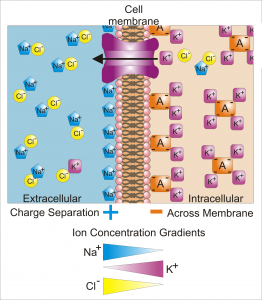In a cell, a chemical potential is developed when there is a difference in concentration of a chemical across a membrane. In neuron signaling, chemical potentials develop due to the high concentrations of sodium outside of the cell and high concentrations of potassium inside the cell. The potential pushes sodium to enter the neuron and pushes potassium to leave. This chemical potential is high enough that potassium will leave the cell during repolarization. It will develop a new electrical membrane potential as a result.

(“Basis of membrane potential 2”, 2011)
2 thoughts on “Chemical Potential”